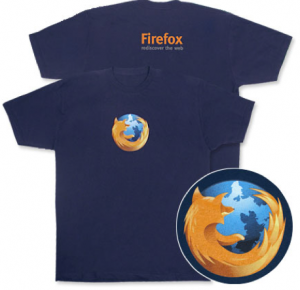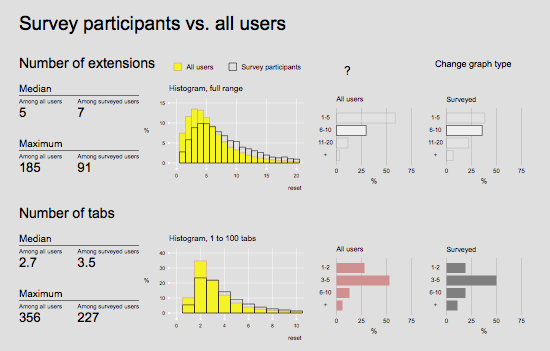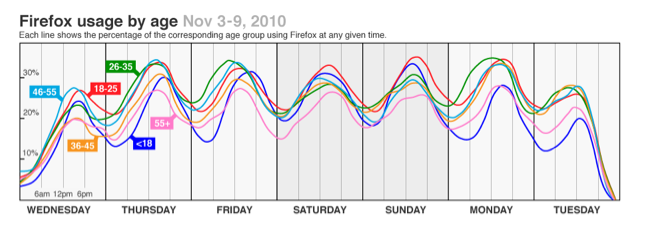[Note: cross-posted on Mozilla Labs]
Back in November, Mozilla Labs and the Metrics Team together launched the first Mozilla Open Data Visualization Competition. While we set out to discover creative visual answers to the open question, “How do people use Firefox,” we really didn’t know what level of participation to expect from the Mozilla and data analysis communities. In fact, we were overwhelmed by both the number and quality of submissions – so much so that we had to give ourselves an extra few days to thoroughly review them all!
In all, we received 32 high-caliber submissions. The “visualizations’ took a number of forms, from tools to easily query the data to interactive web applications. They also covered a broad range of important topics, from plugin memory consumption to user web activities. You can find all 32 submissions here; entrants, if you haven’t already, be sure to check out the page as our panel of judges has left feedback on each and every submission.
Needless to say, we want to thank all the participants – your work has made our initial open data competition an overwhelming success and many of your insights will directly help the Firefox team develop a better web browser. In thanks, we’ll be sending this awesome Firefox t-shirt to each entrant:

We also want to thank our 3 partner judges: David Smith, Revolution Analytics; Andrew Vande Moere, Information Aesthetics; and Brian Suda, author of A Practical Guide to Designing with Data. The success of the competition was largely due to your help in publicizing the event and thoroughly evaluating the entries.
And now…lets get to the winners!
Grand Prize
Survey Participants vs. All Users – Contributed by: James Fiedler
While deciding amongst the 32 entries was difficult, the focus on a single, very relevant and important question distinguished this entry. James focused on contrasting survey participants with all users (critical as we often use survey data for segmentation), then set up a simple and helpful environment for the user to explore and discover interesting conclusions of their own. This submission is exactly the type of work we were hoping for: an elegant visualization that presents data around an important and complex question in a clear and easy-to-understand way. James will receive a $300 Amazon gift card for his excellent work.
Finalists
Test Pilot Explorer – Contributed by: Lon Riesberg
One of the more creative entries, Lon created a custom “explorer” that essentially “plays back” time-ordered events as animated plots and includes filters to customize what data is shown. This explorer really shows how you can “see” user behavior on a mass scale, and while we had some quibbles about some of the details of the visualization itself, we found it to be a powerful and enjoyable data exploration tool. Lon will receive a set of all 4 Edward Tufte books for his work.
Firefox Usage by Age – Contributed by: Tom Haynes (University of Michigan)
Tom’s entry also focused on one particular element of the data. His execution sets this submission apart, as his visualization doesn’t try to encompass everything, but tells a clear, specific story around how Firefox usage times vary across age groups. Tom will receive a set of all 4 Edward Tufte books for his work.
Honorable Mention
Given the number of worthy submissions, we decided to hand out 5 Honorable Mention Awards in addition to the original 3 prizes. For varying reasons, we thought these entries were particularly valuable and each team will receive Tufte’s latest book, Beautiful Evidence, in recognition of their great work. Good Job!
Firefox browser – Event Sequences – Contributed by: Benoît Pointet
Firefox 4 beta UI Component Use vs. User Expertise – Contributed by: Nicolas Garcia Belmonte, Maria Luz Caballero
Browser Usage Over the Course of a Day Contributed by: Christian Kreibich
Bookmark a Lot, Browse a Lot – Contributed by: Eugene Tjoa
Firefox Plugin Memory Consumption– Contributed by: Diederik van Liere and David Eaves
Again, thanks to all the participants, judges, and everyone else who helped make this first open data competition such a success! Participants should receive an email within the week with details on how to receive the prizes and t-shirts.
And keep refining those data hacking skills – there will be more open data competitions in the near future!

